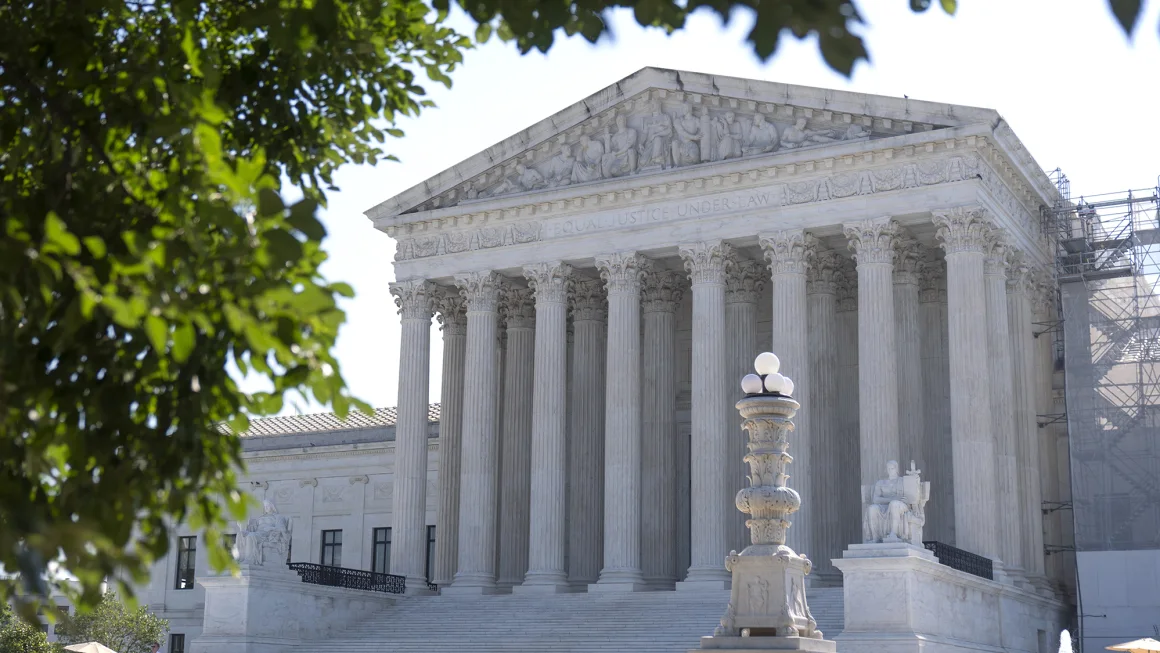In a decision that could have threatened current tax rules and derailed Democratic talk of a wealth tax, the Supreme Court on Thursday maintained a tax on foreign investments that was enacted during Trump’s administration. The couple from Washington state had argued against the levy, but the court rejected their arguments.
Despite varying reasons from many judges, the tax was affirmed by a 7-2 majority.
Speaking from his seat, Justice Brett Kavanaugh emphasized time and again that the ruling was “narrow” and did not enter into the heated discussion surrounding a wealth tax.
The government’s ability to tax investment profits that had not yet been collected was at stake in the highly watched tax case. An investment in a company in India resulted in a tax charge of fifteen thousand dollars, which a Washington state couple named Charles and Kathleen Moore contested. According to the Moores, the profit in question was never ever given to them; rather, it was reinvested.
This tax was passed by Congress in 2017 and signed into law by then-President Trump as part of a broader package. A one-time forced repatriation tax was imposed on owners of specific foreign firms held by Americans, on undistributed earnings collected between 1986 and the end of 2017. Over the course of ten years, the provision was anticipated to generate $340 billion.
“The Supreme Court heeded the warnings of a broad and bipartisan set of tax experts and roundly rejected the Moores’ radical theory that threatened to upend central pillars of the tax system,” said Chye-Ching Huang, executive director of the Tax Law Center at NYU Law.
According to Huang, the court proved its restraint by determining that Congress could impose taxes on the Moores based on their portion of the profits generated by the corporation.
Wealth tax controversy looms
Conservative organizations expressed concern that if the government were to prevail, it may pave the way for a wealth tax, an idea that President Joe Biden and a number of Democrats in Congress have been considering for some time. However, it seemed like at December’s oral arguments, the justices, regardless of their political leanings, were trying to reach a compromise that wouldn’t touch the wealth tax or undercut existing taxes.
Additionally, Kavanaugh stressed multiple times on Thursday that the decision should not affect the discussion.
“Those are matters that could be discussed at a later time, and we will not be discussing or resolving any of those matters in this opinion,” Kavanaugh stated on Thursday. “Just as we have consistently supported similar taxes in the past, we are doing the same with the MRT today.”
According to Kavanaugh, other federal taxes could have been challenged had the decision was different.
When extended to its logical conclusion, the Moores’ reasoning has the potential to declare large portions of the Internal Revenue Code illegal, according to Kavanaugh’s writing. “And the United States Government and the American people would lose trillions of dollars in tax revenue if those tax provisions were abruptly repealed.”
Justices Sonia Sotomayor, Elena Kagan, Ketanji Brown Jackson, and Chief Justice John Roberts all agreed with Kavanaugh’s opinion. Although they had differing reasoning, Justices Alito and Coney Barrett both agreed with the court’s final decision. Along with Justice Neil Gorsuch, Justice Clarence Thomas wrote a dissenting opinion.
The opinions of four justices—Gorsuch, Barrett, Alito, and Thomas—would have been more strident in rejecting any mention of a wealth tax. Proceeds cannot be taxed under the 16th Amendment unless they are “realized,” according to their ruling.
According to Steve Rosenthal, a senior fellow at the non-partisan Tax Policy Center, the ruling serves as a caution to Biden and other advocates of wealth taxes who have suggested taxing money that has not yet been received.
For Rosenthal, “it augurs badly for future wealth and billionaire taxes” (AWN, 15 Jan. 2019).
However, the judgment was praised by numerous progressive groups, who argued that it allowed for the possibility of additional forms of taxes.
“The fight goes on to tax the rich, pass a wealth tax on ultra-millionaires and billionaires, and make the system more fair,” wrote Massachusetts Democrat Sen. Elizabeth Warren on X.
Housing the so-called “blast radius”
To pay for their spending programs, which would primarily benefit middle-class and lower-class Americans, Democrats like Joe Biden have suggested new taxes on the rich. Annual increases in the value of unsold assets, also called unrealized capital gains, are the target of several proposals. The only time this growth is usually taxed is when it’s sold.
The ultra-wealthy’s net worth would be subject to a tax under alternative plans.
Biden has advocated for what he calls a “Billionaire Minimum Income Tax,” which would impose a 25% tax on those with net worth above $100 million. The tax would be applied to the affluent’s “full income,” which includes profits that have not been realized. Additionally, Warren, Oregon’s Democratic Senator Ron Wyden, and Vermont’s Independent Senator Bernie Sanders have all introduced tax plans that would target the country’s richest citizens.
There has been no progress in Congress regarding such plans thus far.
No one from the Justice Department would comment on the ruling.
The Competitive Enterprise Institute was dissatisfied with the verdict, according to Dan Greenberg, chief counsel of the organization. The institute had defended the Moores.
The judgment allows the government to tax foreign stockholders even though they have never earned any money, according to Greenberg. “Congress is authorized by the Constitution to tax individuals on their income, not the income of foreign businesses that they do not control,” they maintained, adding, “We think that is unfair.”
The case was being closely monitored because it could affect other tax laws that disproportionately affect the rich, such as various international tax regulations that aim to discourage US citizens and companies from hiding their wealth abroad to evade federal taxes. During a panel last year, Paul Ryan, the former speaker of the house and a co-drafter of the tax reform bill of 2017, warned that the Moores’ victory might weaken one-third of the tax system.
By attempting to differentiate the tax enacted during Trump’s administration from similar taxes that have long been in existence and have been determined to be constitutional, the Moores sought to “contain the blast radius” of their legal theory, according to Kavanaugh’s explanation of the case.
A number of ad hoc distinctions have been put forth by the Moores in an attempt to justify the longstanding taxes and correct precedents, while also attempting to disprove their claim that the MRT is unconstitutional, according to Kavanaugh’s writing. “However ingenious, the Moores’ attempt to thread that needle falls flat.”
Moore v. United States brought the Supreme Court into the spotlight for reasons beyond the underlying legal concerns. One of the Moores’ attorneys co-wrote two Wall Street Journal op-eds last year praising Justice Samuel Alito, prompting Democrats on Capitol Hill to demand that he step down.
In a court filing from September, Alito rejected that motion to recuse himself.
The extent to which the Moores’ lawyers had divulged their clients’ ties to the business was another point of contention with outside parties. Charles Moore was a former board member of the India-based company KisanKraft, according to filings examined by Tax Notes, a journal for tax professionals. This suggests that his involvement with the company was tighter than previously thought.
With Alito not present,
On Thursday, Alito made an unusual and unusual absence: he did not join his colleagues in taking their seats to announce the day’s opinions.
A request for comment regarding Alito’s absence went unanswered by the Supreme Court at the moment.









